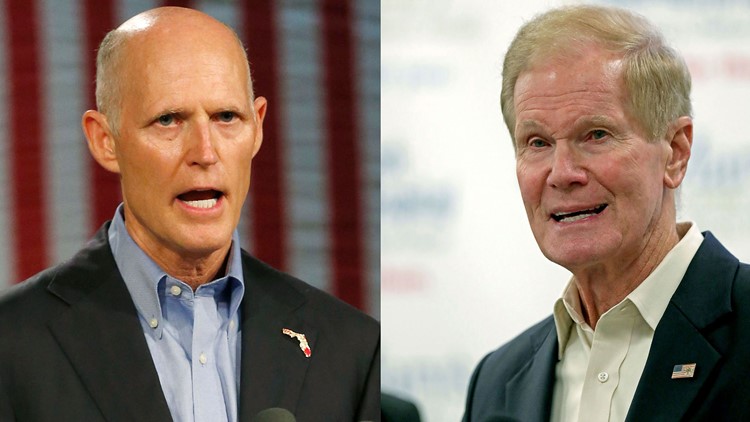The race for Florida’s U.S. Senate seat – one of the most hotly-contested and closely-watched races from across the country – remains up in the air the morning after the midterm election.
As of 10 a.m. Wednesday, with 100 percent of the precincts reporting, Republican Rick Scott maintained about a 34,537-vote lead over incumbent Democratic Sen. Bill Nelson. At this point, that translates to 50.21 percent for Scott versus 49.79 percent for Nelson.
What is the process for a recount?
Scott is winning by about a 0.43 percent margin. Florida law provides for automatic recounts when the margin of victory for a given office or measure is equal to or less than 0.5 percent of the total votes cast for that office.
Nelson called for a recount Wednesday morning in the Senate race against Scott.
"We are proceeding to a recount," Nelson said in a statement.
Nelson's campaign said Scott prematurely claimed victory Tuesday night.
Scott campaign spokesperson Christ Hartline refuted Nelson's request for a recount.
"This race is over. It's a sad way for Bill Nelson to end his career," Hartline said. "He is desperately trying to hold on to something that no longer exists."
10News political expert Lars Hafner said "it's going to be a pretty high bar" for Nelson to make up the 34,537-vote discrepancy with Scott.
Nelson would need to make up for the discrepancy with outstanding provisional ballots, absentee ballots and undervotes.
A spokesperson with Nelson's campaign said it plans to have observers in all 67 counties watching "for any irregularities, mistakes or unusual partisan activities."
Hafner also pointed out that "the Nelson campaign has nothing to lose."
Secretary of State Ken Detzner – who Scott appointed – is responsible for ordering the recount because Florida's U.S. Senate seat is a federal race.
State law states the secretary of state is responsible for ordering recounts in federal, state and multi-county races. The county canvassing board or the local board responsible for certifying the election is responsible for ordering recounts in all other races.
If Detzner approves Nelson's request for a recount, each canvassing board in the state's 67 counties would recheck the total tally through automatic tabulating equipment.
If the margin of victory is equal to or less than 0.25 percent, a hand recount is ordered. Automation is used otherwise.
However, Florida law also states a candidate defeated from an office by 0.5 percent or less can submit a written request not to hold a recount. In this case, Nelson could have also requested for Detzner not hold a recount.
What's happens next
A victory for Scott would mean he would unseat Nelson, who is a three-term U.S. Senator. If Scott wins, become Florida’s junior senator on Jan. 3, 2019, at a swearing-in ceremony.
The most famous Florida recount was in the 2000 presidential election between George W. Bush and Al Gore. The U.S. Supreme Court halted the recount just before the deadline, giving the state's electoral votes and the presidency to Bush.
Note: The Associated Press contributed to this story.



